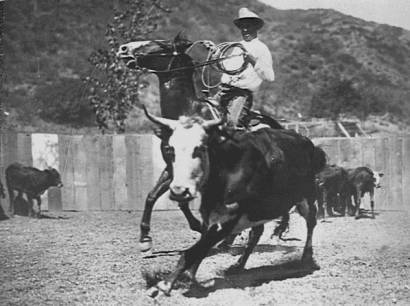This Week's Story
Will Rogers was the "common man." Nobody was too high or too low for him to sit and talk with.

This Week’s Story relives American history and the Bible through brief inspiring stories presented on mp3 audio recordings and text for reading.
Americans Laugh, part two
Will Rogers made Americans laugh in good times and dreadful times. He was their funny wise cowboy. No-fancy-airs about him, even though his accomplishments by the 1920’s and 1930’s read like mythology. He still roped wild steers and did lariat stunts, but not for money. He was “the common man” with his family, ranchers, kings, queens, presidents, farmers, bankers, kids, salespeople, hoboes, people. Nobody was too high or too low for him to sit and talk with. “When I die,” he said, “put on my gravestone, ‘I joked about every prominent man of my time, but I never met a man I didn’t like.’”
Will was the highest paid Hollywood movie star of his time and was in 71 movies. He was a radio star and authored several books. Hundreds of newspapers published his columns. His daily “Will Rogers Says” had an estimated 40 million readers. Around the world and throughout the United States, he lectured by joking about American politics, controversial topics, people and events of the day. His humor was not mean. An arrogant person or custom might receive a jab, but Will’s humor left no wounded, even when it exposed problems. His philosophy was: Leave it up to the listeners or readers to do what they want with what I give them.
Will became a goodwill ambassador among nations, saying what no ordinary politician or world leader could say. His humor deflected attack, but it did not stop his audience from listening. Surprise was a constant. No one could be sure what he might say. The man was casually fearless about his topics. His words might be made up on the spot or Oklahoma-ranch idiom, while his deliberately cockeyed grammar fit no standard English.
When someone suggested to him that he used bad grammar, he replied, “Shucks, I didn’t know they was buyin’ grammar now. I’m just so dumb I had a notion it was thoughts and ideas. I write just like I talk. If there’s bad grammar, it ain’t intentional.”
His humor glinted with common sense and a basic morality. Just before Franklin D. Roosevelt defeated President Hoover in the Presidential election Will wrote, “Come pretty near having two holidays of equal importance in the same week, Halloween and election, and of the two election provides us the most fun. On Halloween they put pumpkins on their heads, and on election they don’t have to.”
About liberty he said, “The greatest aid that I know of that any man could give the world today would be a correct definition of ‘liberty.’ Everybody is running around in a circle announcing that somebody has pinched their ‘liberty.’….so the question arises ‘how much liberty can I get and get away with it?’ Well, you can get no more than you give. That’s my definition but you got perfect ‘liberty’ to work out your own, so get in.”
When Will died in a plane crash in Alaska, Rupert Hughes, a friend gave a funeral eulogy at the Hollywood Bowl. Will Rogers, he asserted “rode the range of our American political life, taking care of those who would take from us our liberties. The first thing a despot does is to stifle and throttle laughter. A dictator in this country would have a hard time with Rogers present.”
This is Barbara Steiner waiting to sit on a corral and talk with Will.
Please keep following stories at www.thisweeksstory.com.
<< previous story] [next story >>
We invite your comments! [click here to comment]
This Week's Story is a non-profit supported by listeners. [click here to make a donation]
 click here to play audio
click here to play audio